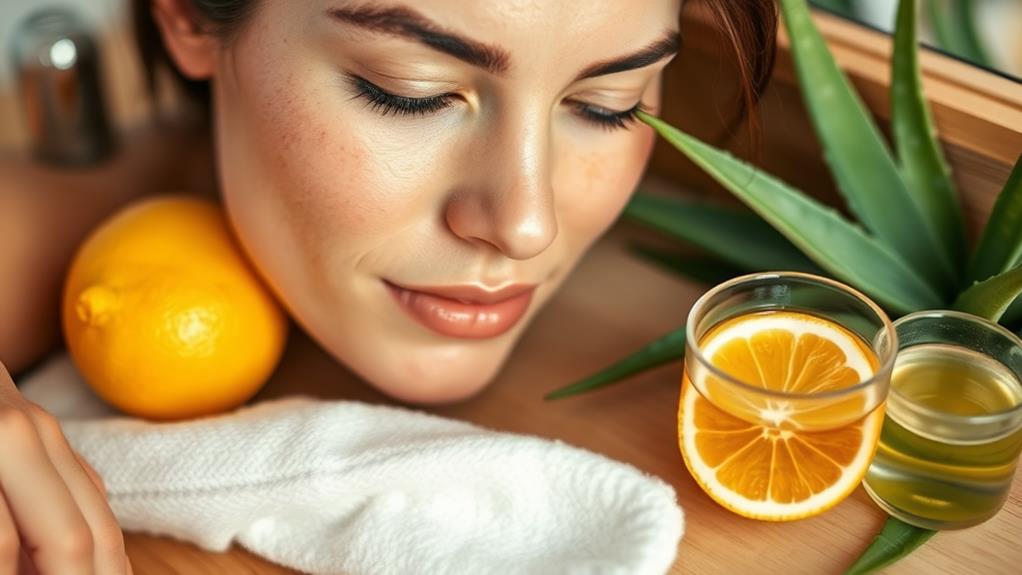If you've noticed dark spots on your skin, you're not alone; many people experience this issue due to factors like sun exposure and aging. Identifying the underlying causes is essential for effective management, but it doesn't stop there. You'll want to explore various remedies, from simple home treatments to advanced professional options, while also considering preventive measures to keep your skin clear. So, what steps can you take to not only treat these spots but also guarantee they don't return? The answer might surprise you.
Understanding Dark Spots
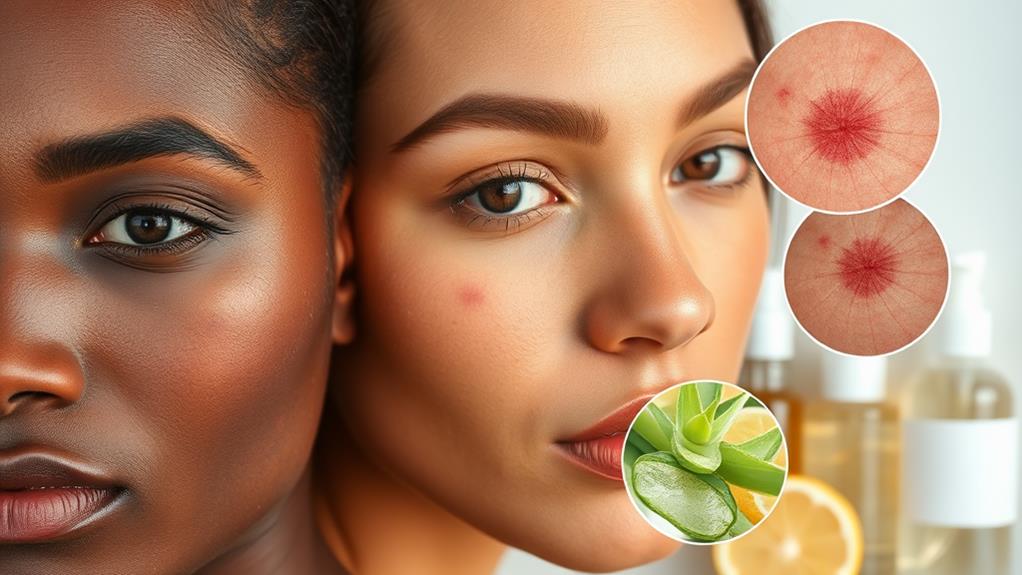
Dark spots, often appearing on the skin due to sun exposure or aging, can be frustrating to deal with. You might look in the mirror and wonder, "Where did these come from?" It's like a surprise party you never wanted!
These little spots can pop up anywhere, making your skin look uneven and older than it is.
Understanding dark spots is the first step in tackling them. They occur when your skin produces more melanin, which is that pigment that gives your skin its color. You know how a banana turns brown when it's left out too long? Well, your skin can do something similar!
Factors like sun exposure and aging can speed up this process, leading to those pesky dark patches.
Don't worry, though! You're not alone in this. Many people deal with dark spots, and there are ways to manage them. Learning about what causes these spots can help you take steps to prevent them.
Common Causes of Dark Spots
Several factors can contribute to the formation of dark spots on your skin. One of the main culprits is sun exposure. When you soak up the sun, your skin produces more melanin to protect itself, leading to those pesky spots.
So, if you love tanning, you might want to rethink that strategy!
Another common cause is aging. As you get older, your skin can start to lose its youthful glow and develop more spots.
It's like your skin's way of saying, "I've been around the block a few times!"
Hormonal changes, like those during pregnancy or while taking certain medications, can also trigger dark spots.
These changes can make your skin a bit moody, causing it to produce excess pigmentation.
And let's not forget about acne. If you've battled breakouts, you might find dark spots lingering after the pimple has gone.
It's like a little reminder of that pimple party you didn't want to attend!
Types of Dark Spots
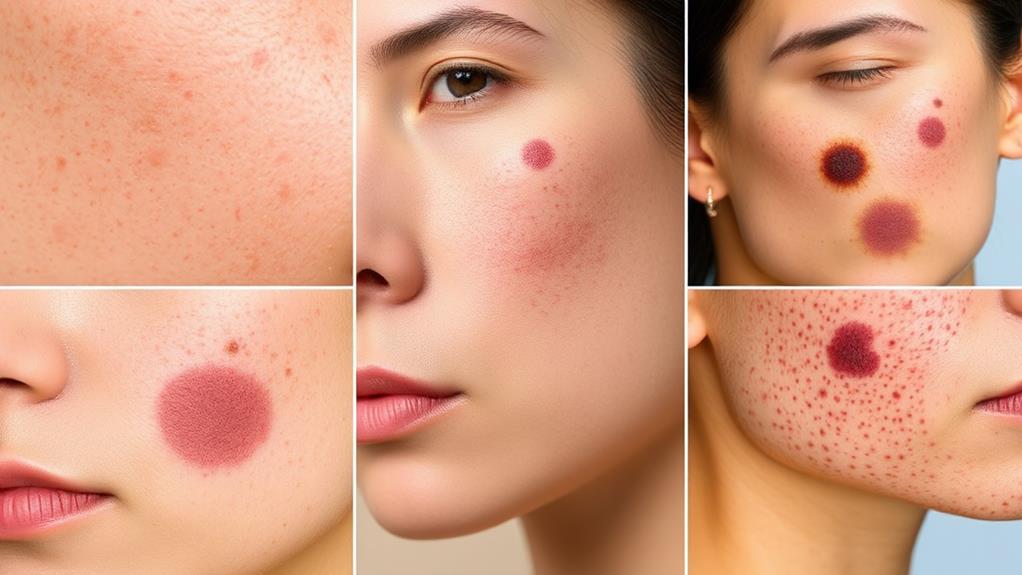
Many people experience different types of dark spots, each with its own unique characteristics and causes. One common type is called sunspots, or solar lentigines. These pesky little spots show up when you've spent too much time in the sun, and they often appear on your face, hands, and shoulders. They're like reminders of your sunny days!
Another type is melasma, which often pops up during pregnancy or when you're taking birth control pills. It usually shows as larger patches on your cheeks or forehead, and it can be quite stubborn.
Then there are post-inflammatory hyperpigmentation spots, which can occur after your skin has healed from an injury or acne. They're like the skin's way of saying, "I remember that!"
Lastly, there are freckles, which many people find cute. They're small, light-brown spots that appear, especially in the summer, thanks to sun exposure.
Understanding these types of dark spots can help you figure out how to deal with them. Remember, knowledge is power, and it's the first step toward clearer skin!
Effective Home Remedies
Home remedies can be a fantastic way to tackle dark spots without breaking the bank. You don't need fancy products when you've got some ingredients right in your kitchen!
For instance, lemon juice is a superstar. Its natural acidity helps brighten skin. Just apply a little with a cotton ball, let it sit for about 10 minutes, then rinse. But remember, don't go out in the sun right after, or you might end up with a sunburn instead!
Another great option is aloe vera. It's soothing and helps fade those pesky spots. Simply scoop some fresh gel from the plant and massage it onto your skin. Leave it on for about 30 minutes for the best results.
You can also mix honey and yogurt to create a nourishing mask. Honey hydrates, while yogurt contains lactic acid, which gently exfoliates. Apply this mix, relax for 20 minutes, then rinse off.
Lastly, don't forget about green tea! Brew a cup, let it cool, and use it as a toner. It's packed with antioxidants.
With these home remedies, you're well on your way to brighter skin!
Professional Treatments Available
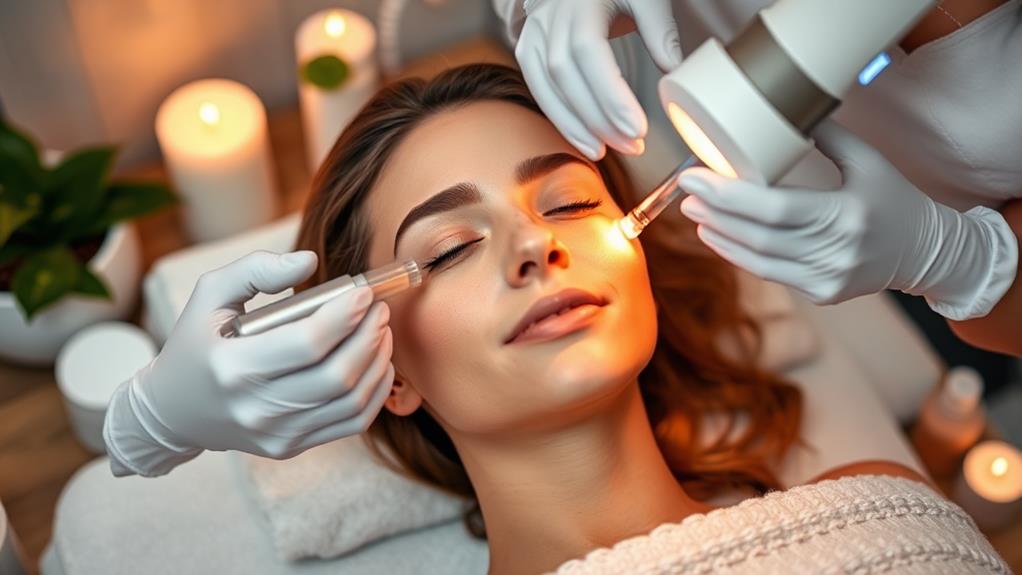
While home remedies can provide a good starting point for managing dark spots, sometimes you might want to explore more advanced options. If you're looking for faster results, professional treatments can work wonders. Dermatologists offer various procedures that target those pesky spots directly.
One popular option is laser therapy. It uses focused light to break down the pigment in dark spots, allowing your skin to heal and look brighter. It's like a superhero zap for your skin!
Another choice is chemical peels, where a special solution is applied to exfoliate the skin, revealing a fresh layer underneath. You'll leave feeling like a brand-new person!
Microdermabrasion is also a great option. It gently sands away the top layer of skin, which can help lighten dark spots. Plus, it can make your skin feel smoother than ever.
Then there's cryotherapy, where super-cold temperatures freeze the dark spots away. Sounds wild, right?
Before diving into treatment, chat with a dermatologist. They'll help you figure out which option suits your skin type best.
Daily Skincare Routine Tips
Incorporating a consistent daily skincare routine can greatly help in managing dark spots. Start your day with a gentle cleanser to wash away any dirt or oil from your skin. It's like giving your face a fresh start, and who doesn't love that?
Next, grab a toner. This isn't just a fancy add-on; it helps balance your skin's pH and prepares it for the next steps.
Now, here comes the hero of your routine: sunscreen! Applying SPF every morning is a must. Think of it as an invisible shield that protects your skin from harmful UV rays, which can worsen dark spots.
In the evening, repeat the cleansing and toning steps. After that, use a serum with ingredients like vitamin C or niacinamide. These can brighten your skin and help fade those pesky spots.
Finally, don't forget a good moisturizer to keep your skin hydrated.
Stick to this routine daily, and you'll be well on your way to achieving a more even skin tone. Remember, consistency is key—your future self will thank you for it! Who knew skincare could be this easy and fun?
Lifestyle Changes for Prevention
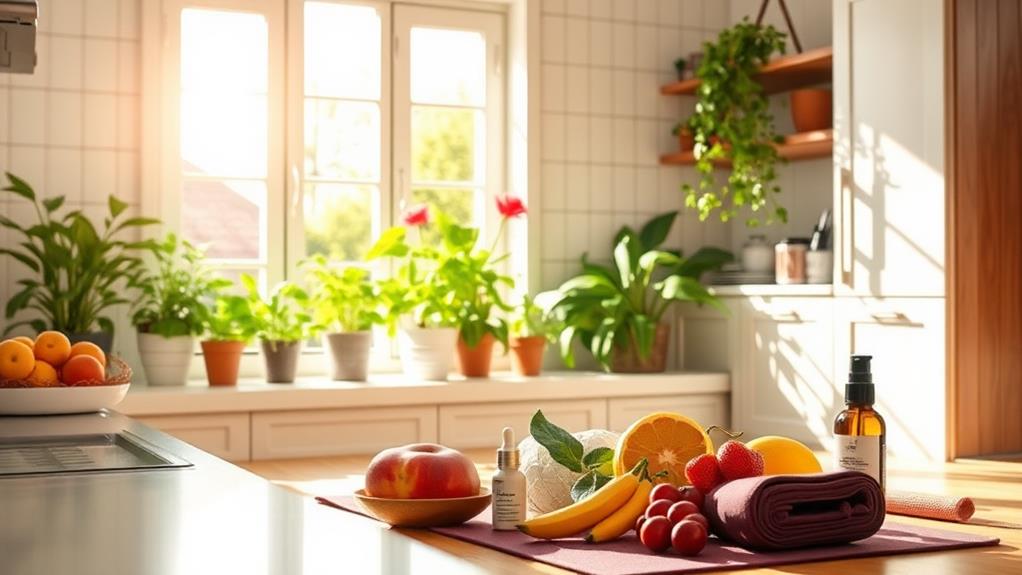
To keep dark spots at bay, adopting certain lifestyle changes can make a significant difference alongside your skincare routine.
First off, you might want to stay hydrated. Drinking plenty of water helps your skin stay fresh and glowing, kind of like a plant getting enough sunshine!
Next, think about your diet. Adding more fruits and veggies can really boost your skin's health. Foods rich in antioxidants, like berries and leafy greens, can help fight off those pesky dark spots.
Also, try to get enough sleep. When you snooze, your body repairs itself, including your skin. So, aim for that beauty sleep—your skin will thank you!
Stress can also play a role in skin issues. So, finding ways to relax—like reading a book, going for a walk, or practicing some fun hobbies—can keep your skin and mind happy.
Lastly, avoid smoking and limit alcohol. These habits can make your skin age faster, leading to more dark spots.
Importance of Sun Protection
How essential is sun protection in your skincare routine? It's super important! Think of the sun as a giant spotlight, shining down on your skin every day. If you skip sunscreen, you're waving hello to dark spots, wrinkles, and even skin cancer. Yikes!
When you step outside, even on cloudy days, UV rays can sneak in and cause damage. Applying sunscreen helps shield your skin like an invisible superhero cape. You should use a broad-spectrum sunscreen with at least SPF 30, and don't forget to reapply it every two hours, especially if you're sweating or swimming.
You might think, "I don't need it; I'm indoors!" But those sneaky rays can still reach you through windows.
